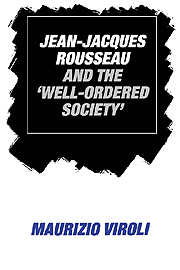1 - Introduction
Published online by Cambridge University Press: 05 November 2011
Summary
Almost everything in Rousseau is the subject of debate. But one of the points which does, probably, command universal agreement is that Rousseau set out to propound a theory of a just political order, or, to use a phrase which reflects his intention, the doctrine of the ‘wellordered society’.
Every political society establishes its own political order, but it is only a political order which satisfies certain moral criteria which may correctly be described as just one. It was precisely because he hoped to define these criteria that Rousseau undertook his study of political systems. For him, order is not, in itself, a primary value; it is the just political order which is the ground of value since it is the necessary condition for the primary values of liberty, virtue and happiness. It is Hobbes, not Rousseau, who can correctly be described as the philosopher of an unqualified political order, and the political philosophy of the Social contract may legitimately be interpreted as the search for a theoretical alternative to the order propounded in Leviathan.
The phrase ‘well-ordered society’, which we find at the beginning of the first version of the Social contract, suggests a society ordered in such a way that men find it in their interest to treat their fellows with justice and consideration – that is to say, to live in harmony.
- Type
- Chapter
- Information
- Jean-Jacques Rousseau and the 'Well-Ordered Society' , pp. 1 - 14Publisher: Cambridge University PressPrint publication year: 1988

